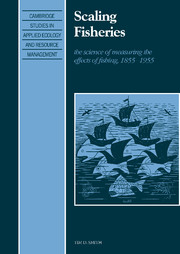Book contents
- Front Matter
- Contents
- Acknowledgements
- Preface to the Paperback Edition
- References
- Units used in the text
- Part I INTRODUCTION
- Part II DEVELOPING METHODS, 1855–1940
- 2 Research approaches, 1855–1890
- 3 Measuring the effect of fishing, 1890–1900
- 4 The International Council for the Exploration of the Sea, 1900–1920
- 5 Predicting fluctuations, 1920–1930
- 6 A priori methods, 1930–1940
- Part III THREE PARTIAL THEORIES, 1940–1955
- Notes
- References
- Index of people
- Subject index
6 - A priori methods, 1930–1940
Published online by Cambridge University Press: 22 September 2009
- Front Matter
- Contents
- Acknowledgements
- Preface to the Paperback Edition
- References
- Units used in the text
- Part I INTRODUCTION
- Part II DEVELOPING METHODS, 1855–1940
- 2 Research approaches, 1855–1890
- 3 Measuring the effect of fishing, 1890–1900
- 4 The International Council for the Exploration of the Sea, 1900–1920
- 5 Predicting fluctuations, 1920–1930
- 6 A priori methods, 1930–1940
- Part III THREE PARTIAL THEORIES, 1940–1955
- Notes
- References
- Index of people
- Subject index
Summary
How far … then mathematics will suffice to describe, and physics to explain, the fabric of the body, no man can foresee.
D'Arcy Thompson 1917The value of using mathematics in the study of biology has been advocated by philosophers and some biologists since well before the mid-1800s; the dangers of allowing its overwhelming deductive power to control the biologist's thinking has been argued just as long. Despite the purported dangers, however, in the late 1800s and the early 1900s mathematics was beginning to be applied to many biological systems. For example, Heincke in his study of the races of herring criticized his colleagues for their ‘aversion toward measurements and numbers’ while at the same time acknowledging their reticence to use this tool because, as he put it, ‘many of them have no mathematical sense, and no schooling in mathematics.’ Heincke's use of mathematics was, however, primarily statistical and descriptive of what he had measured, involving a rigor that he saw as essential if one ‘demands that his labours be regarded as a contribution to the knowledge of the true laws of nature’ (see Sinclair and Solemdal 1988 p. 195). In 1917 D'Arcy Thompson published a book titled On growth and form, which relied heavily on mathematics from a different point of view. Oriented primarily towards describing the growth of organisms, he relied on mathematical descriptions of their patterns of growth and morphology.
- Type
- Chapter
- Information
- Scaling FisheriesThe Science of Measuring the Effects of Fishing, 1855–1955, pp. 194 - 236Publisher: Cambridge University PressPrint publication year: 1994
- 1
- Cited by

